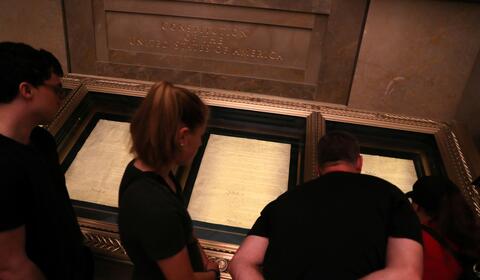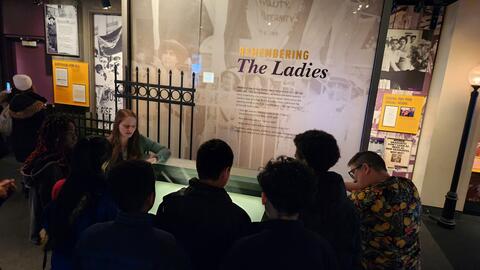Access Services
The National Archives is accessible and ADA compliant. If you have questions about services or need more information, please contact Visitor Services at visitorservices@nara.gov.
Blind and Low Vision Visitors

Copies of the Constitution and Declaration of Independence are available in braille at the Visitor Services Desk in the Visitor Orientation Plaza and the Rotunda.
Deaf and Hard of Hearing Visitors
ASL interpreters are available with at least 14 business days’ advance notice. To make reservations for sign language interpretation on a visit or tour, please contact Visitor Services at visitorservices@nara.gov.
Our "Welcome to the National Archives Museum" video in American Sign Language (ASL) with English closed captioning highlights the various exciting permanent and changing exhibits, special galleries, and the National Archives store.
Service Animals

The National Archives’ Service Animal Policy permits dogs and other service animals specifically trained to perform tasks for persons with disabilities. Therapy animals are not considered service animals under the ADAAA 2008. Service animals must be under the control of their handlers at all times.
Wheelchairs

A limited number of manual wheelchairs are available for visitors on a first-come, first-served basis. All facilities are accessible by elevator. Please see Accessing the DC-area facilities for more information on accessible entrances and routes. If you require assistance, please ask a visitor services representative.
Information Communication Technology
The National Archives is committed to making its electronic and information technologies accessible to the widest possible audience, including individuals with disabilities. NARA regularly monitors its sites to ensure that they meet and exceed the requirements of Section 508 of the Rehabilitation Act (29 U.S.C. 794d), as amended in 1998, and the W3C Web Content Accessibility Guidelines.
NARA's Federal Section 508 Coordinator is the primary point of contact for NARA's efforts to provide individuals with disabilities with equal access to electronic information and data. These efforts pertain to Section 508 of the Rehabilitation Act of 1998.
Contact
Email:
508feedback@nara.gov
Mail:
National Archives and Records Administration
Section 508 Coordinator
8601 Adelphi Road, Room 4400
College Park, MD 20740-6001
Telephone: 301-837-1514
Alternate Access to Web Information
If the format of any material on our website interferes with your ability to access the information, please contact us at the address above.
To allow us to respond in the manner most helpful to you, please let us know:
- the nature of your accessibility issue,
- your preferred format for receiving the material,
- the web address (URL) of the material with which you are having accessibility issues.
- your contact information.
Learn More
Section 508 is a federal law that requires agencies to provide individuals with disabilities with access to electronic information and data comparable to those who do not have disabilities, unless an undue burden would be imposed on the agency. The Section 508 standards are the technical requirements and criteria used to measure conformance within this law. More information on Section 508 and the relevant technical standards can be found on the following sites:
- Section508.gov provides federal employees and the public with access to resources for understanding and implementing the requirements of Section 508, including Section 508 tools, resources, standards, and news.
- U.S. Access Board's Section 508 provides information on Section 508 law, including frequently asked questions and standards.
- Web Accessibility Initiative provides strategies, guidelines, and resources to make the web accessible to people with disabilities.
The National Archives takes protecting your personal privacy seriously. Our Privacy and Use page describes our policies and procedures on the collection, use, and disclosure of your information. Visit our Privacy Office page to view the National Archives' privacy documentation, including Privacy Impact Assessments (PIAs) and System of Records Notices (SORNs)."